Most Atlantic salmon anglers will have a Cascade salmon fly pattern tucked in their fly box because, since its creation by Ally Gowans, it’s become one of the…
Most successful salmon fly patterns
Therefore, if you’re serious about salmon fishing, you need to add a Cascade fly to your salmon fly box.
It’s a universal salmon fly that can catch fish throughout the season and in most river conditions.
So…
How to tie the Cascade salmon fly
Single, double, and trebles hooks and tubes can be used to tie this salmon fly. However, I prefer to tie this fly on a double hook and tubes (aluminum, and copper).
Fly tying material list double hook version:
- Hook – Partridge Nordic double (size 12 to 8)
- Thread – Black 8/0
- Tag & Rib – Medium oval tinsel
- Tail – yellow & flame orange bucktail, 2 strands of crystal flash
- Body rear – Holographic silver tinsel
- Body front – black thread
- Wing – Arctic Fox & 2 strands of crystal flash
- Hackle – orange cock over yellow cock
Step-by-step instructions for tying a Cascade salmon fly:
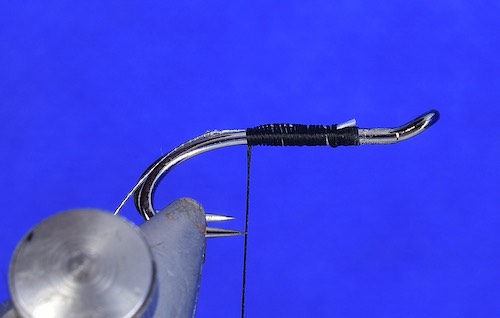
Step 1. Place the hook firmly in the vice and start the thread 3mm from the eye. Wind it down the hook, catching in the silver oval tinsel and stopping opposite the hook points.
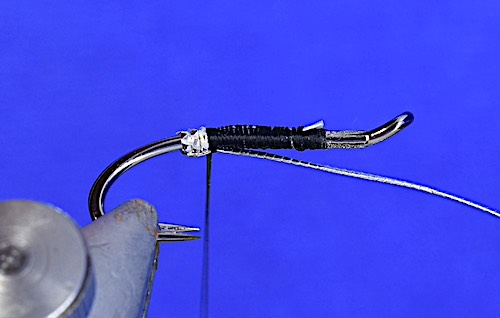
Step 2. Form a silver tag by making 4 turns of oval tinsel down the hook. Then pass the tinsel between the hooks and tie it off on the underside of the shank.
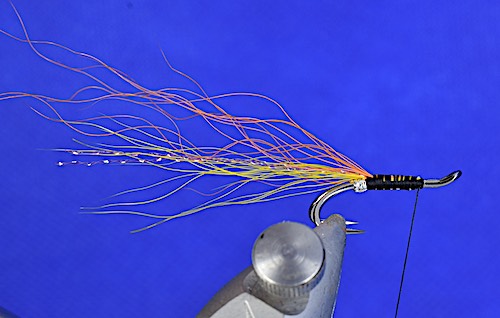
Step 3. To form the tail, tie in a small bunch of yellow bucktail fibers, then 2 strands of crystal flask, and the small bunch of flame-orange bucktail. I prefer the tail length to be twice the length of the body. Trim the waste ends and run the thread towards the eye
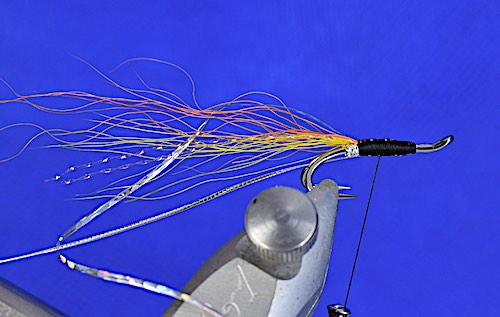
Step 4. Tie in the holographic tinsel on top of the hook and the oval tinsel rib on the underside of the hook. Tidy up the body by taking the thread down to the tail and halfway back up the shank.
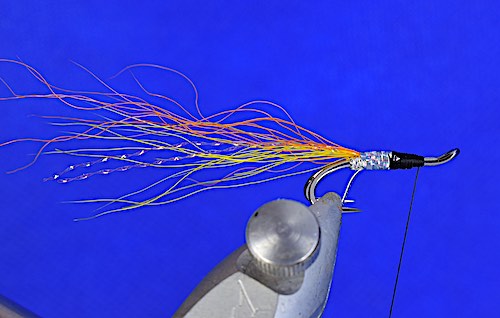
Step 5. Form the rear section of the body by winding the silver tinsel halfway up the shank and tying it off. Trim the waste and form the front section of the body with the black thread.
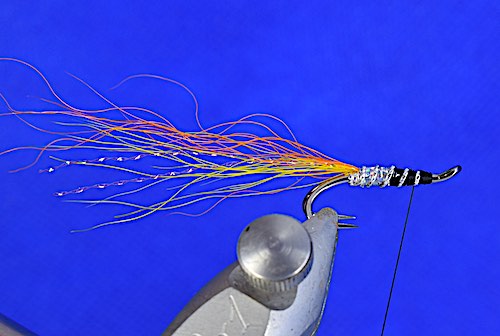
Step 6. Next, wind the oval tinsel up the shank to form an evenly spaced rib (5 to 6 turns). Secure the rib and trim the waste.
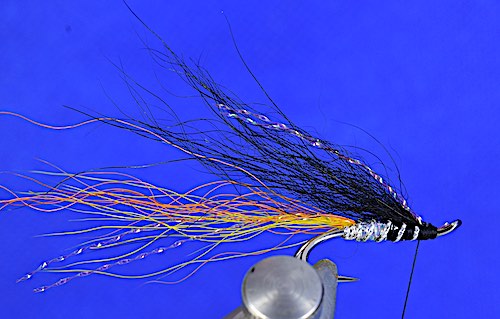
Step 7. Cut a slender bunch of arctic fox hair and tie it in such that it is shorter than the tail. On top of the wing, tie in 2 strands of crystal flash.
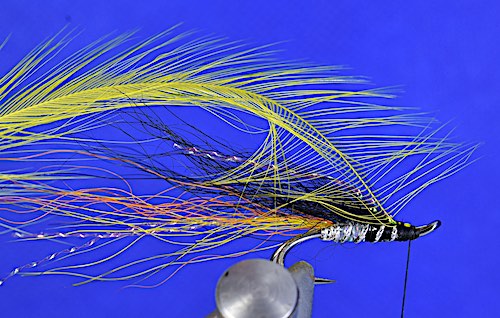
Step 8. Next, tie in a yellow cock feather by its tip and pull back the hackle fibers.
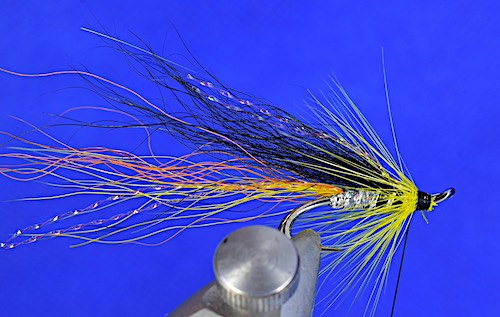
Step 9. Form the first part of the hackle with 2 turns of the cock feather. Then tie in the flame-orange cock feather by its tip.
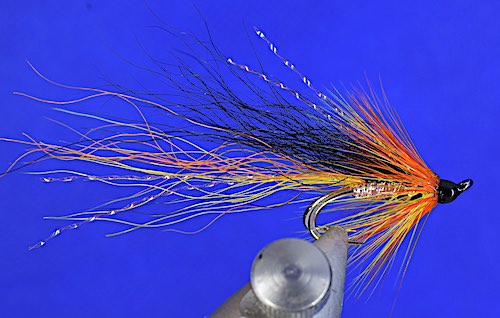
Step 10. Finish the hackle with two turns of the orange cock feather. Trim the waste feather, form a neat heat with the black thread, whip finish, and varnish the head.
Normally I don’t add jungle cock eyes to this fly because it already has enough salmon trigger points.
On the Welsh Dee, I’ve had success fishing Cascade salmon fly variations where the silver tinsel and silver rib are replaced with…
- Gold tinsel & gold rib
- Copper tinsel & copper rib
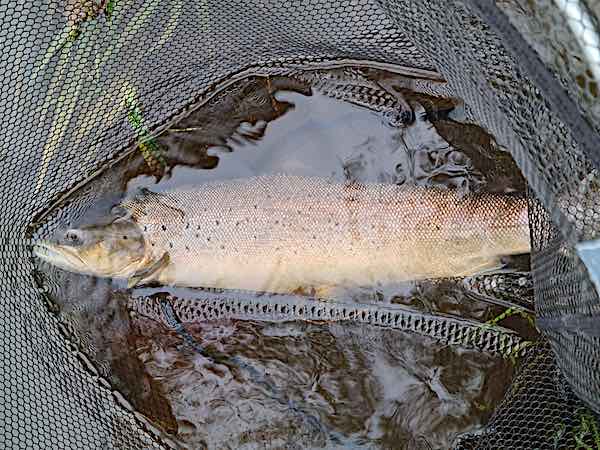
Golden Cascade tube fly
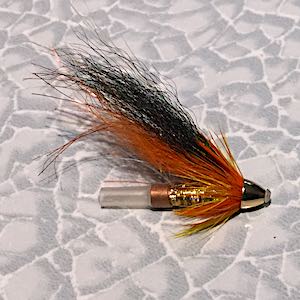
- Tube – 1″ Copper tube
- Thread – Black 8/0
- Body – Gold holographic tinsel
- Rib – Gold wire
- Underwing – Orange arctic fox
- Overwing – gold crystal flash under black arctic fox
- Cock Hackles – yellow behind flame orange – Arctic fox tail
- Head – gold cone
How to fish the Cascade salmon fly
This is a great salmon fly that I fish with confidence in a wide range of river conditions throughout the season.
When summer arrives on the Welsh Dee, I often fish this fly using a floating line tipped with a 10ft intermediate polyleader and 6 ft of 15lbs fluorocarbon leader.
When the river is low during the summer months, I fish it tied on small double hooks (size 12 & 14). Whereas, when the river is running off after a spate, I fish a Cascade fly tied on a large double hook (size 10 to 6) or a tube (aluminum & copper).
Most years, I catch salmon fishing that setup, which includes a…
Salmon “RED LETTER” day in June on Welsh Dee
When I landed 3 salmon in 2hrs, using a size 8D Cascade. Also, it has fooled a few sea trout during the day on a clearing spate.
Finally, I hope this article stimulates you to tie and fish the Cascade salmon fly; I know I will continue to fish them on rivers throughout the UK.
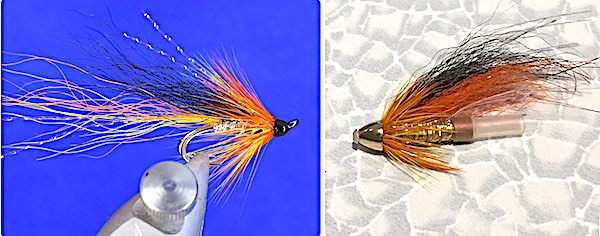
Nice clear instructions! Thanks!
Hi Mike,
That’s great to hear.
Thanks for the feedback, Andrew
Nice straightforward description, thanks very much Andrew.
Hi Donald,
Thanks for the feedback on this post.
Cheers, Andrew
Just got into tying tube flies so this was really helpful. Thanks!
Hi Les,
Great to hear that this post was useful for your fly tying jouney.
Cheers, Andrew